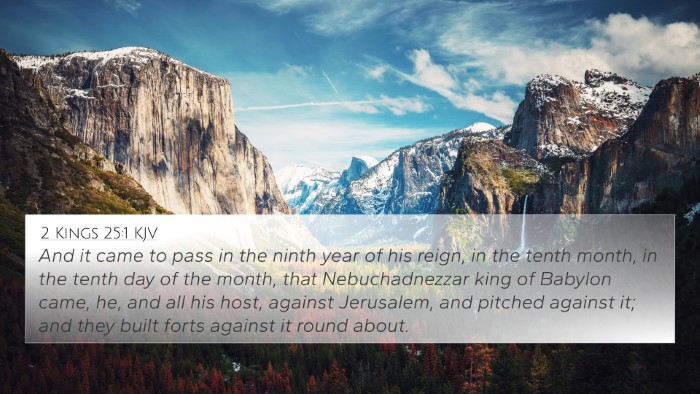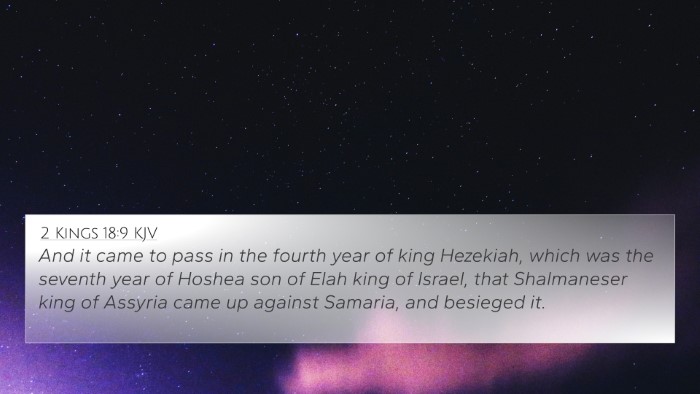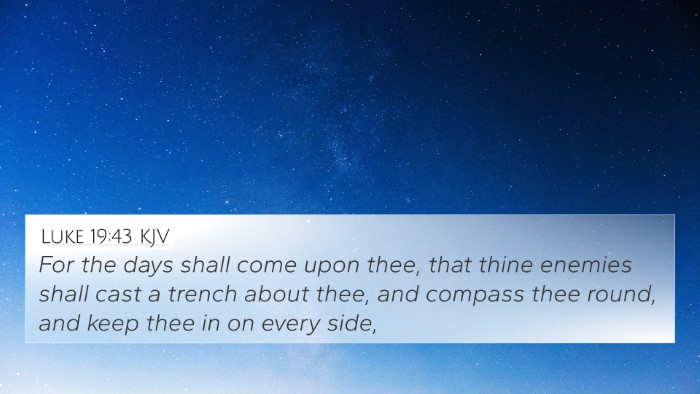Understanding 1 Kings 16:17
The verse 1 Kings 16:17 states: "And he went up and killed him; and he reigned in his stead." This passage occurs during a tumultuous time in Israel's history, characterized by political instability and moral decay. Below, we explore a summarized interpretation of this verse, integrating insights from notable public domain commentaries, including those by Matthew Henry, Albert Barnes, and Adam Clarke.
Contextual Background
The context of 1 Kings 16:17 is critical to understanding its meaning. This verse describes the actions of Zimri, who assassinated Elah, the king of Israel, and subsequently took his place on the throne. The backdrop to this event involves a series of dynastic changes and the consequences of turning away from the worship of Yahweh.
Key Insights
-
Matthew Henry's Commentary:
Henry emphasizes the moral implications of Zimri's actions, highlighting the instability that results from unprincipled leadership. Zimri’s rise to power through assassination measures the depravity present in the nation at the time.
-
Albert Barnes's Notes:
Barnes notes the historical significance of this act as a pivotal moment in the northern kingdom of Israel's decline. He points out that such violent transitions of power reflected a larger pattern of disobedience among the people of Israel towards God.
-
Adam Clarke's Commentary:
Clarke discusses Zimri's rapid rise and fall, arguing that kingship achieved through violence is typically followed by judgment and downfall, a theme evident throughout the historical books of the Bible.
Thematic Connections
This verse can serve as a springboard to explore wider Biblical themes, including:
- God's judgment on corrupt leaders
- The consequences of moral decay
- The nature of power struggles in Israel's monarchy
Bible Verse Cross-References
For a deeper understanding of 1 Kings 16:17, consider the following cross-referenced verses:
- 2 Samuel 15:10: Discusses Absalom's rebellion against David, showcasing similar themes of violent ascension to power.
- 2 Kings 9:10: Encompasses the anointing of Jehu and highlights the judgment against the house of Ahab, relating to political assassinations.
- Isaiah 3:12: Pointers towards societal decay in leadership, reflecting the moral failures seen in 1 Kings.
- 1 Kings 15:30: Notes the causes of Baasha's downfall, paralleling the consequences of Zimri's actions.
- Jeremiah 22:17: A vivid portrayal of the heart of rulers who seek personal gain over righteousness, relevant to the context of Elah's reign.
- Galatians 6:7: Speaks to the universal principle of reaping what one sows, applicable to the metaphorical harvest of Zimri’s violence.
- Proverbs 28:12: Addresses the triumph of the righteous versus the downfall of the wicked leaders, which aptly relates to Zimri's rise.
Comparative Bible Verse Analysis
This verse provides a stark illustration of the chaotic power dynamics at play in Israel. The scripture resonates with a variety of Bible themes, such as the examination of justice and accountability in leadership and the grave consequences that follow unholy or corrupt governance.
Tools for Bible Cross-Referencing
To enhance your study of biblical connections and cross-referencing, consider utilizing tools such as:
- Bible concordance
- Bible cross-reference guide
- Cross-reference Bible study methods
Conclusion
The assassination of Elah by Zimri signifies a critical juncture in the lore of Israel's monarchy, characterized by a perpetual cycle of violence and divine judgment. The understanding of 1 Kings 16:17 provides profound insights into the nature of sin, leadership, and God's sovereign plans amidst human failure.
Further Exploration
Seek to explore how this verse connects more deeply to the overarching narrative of Scripture by examining:
- Links between the prophets and apostolic teachings.
- How the themes drawn from this verse apply to contemporary lessons on leadership and ethical governance.
- Interpreting Biblical themes through extensive cross-references and thematic Bible connections.









